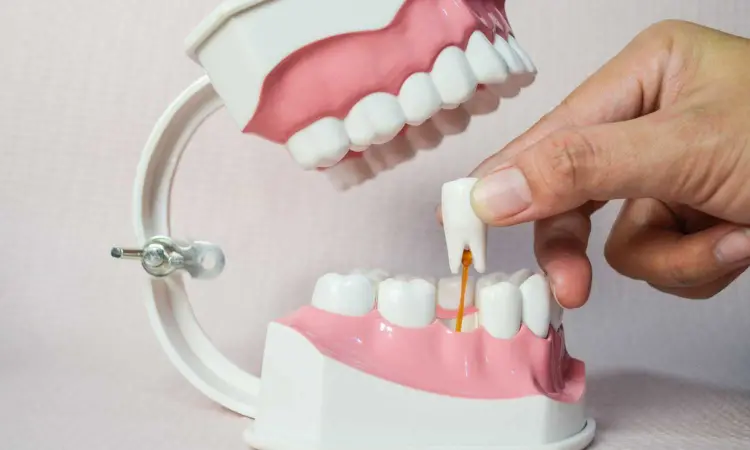- Home
- Medical news & Guidelines
- Anesthesiology
- Cardiology and CTVS
- Critical Care
- Dentistry
- Dermatology
- Diabetes and Endocrinology
- ENT
- Gastroenterology
- Medicine
- Nephrology
- Neurology
- Obstretics-Gynaecology
- Oncology
- Ophthalmology
- Orthopaedics
- Pediatrics-Neonatology
- Psychiatry
- Pulmonology
- Radiology
- Surgery
- Urology
- Laboratory Medicine
- Diet
- Nursing
- Paramedical
- Physiotherapy
- Health news
- Fact Check
- Bone Health Fact Check
- Brain Health Fact Check
- Cancer Related Fact Check
- Child Care Fact Check
- Dental and oral health fact check
- Diabetes and metabolic health fact check
- Diet and Nutrition Fact Check
- Eye and ENT Care Fact Check
- Fitness fact check
- Gut health fact check
- Heart health fact check
- Kidney health fact check
- Medical education fact check
- Men's health fact check
- Respiratory fact check
- Skin and hair care fact check
- Vaccine and Immunization fact check
- Women's health fact check
- AYUSH
- State News
- Andaman and Nicobar Islands
- Andhra Pradesh
- Arunachal Pradesh
- Assam
- Bihar
- Chandigarh
- Chattisgarh
- Dadra and Nagar Haveli
- Daman and Diu
- Delhi
- Goa
- Gujarat
- Haryana
- Himachal Pradesh
- Jammu & Kashmir
- Jharkhand
- Karnataka
- Kerala
- Ladakh
- Lakshadweep
- Madhya Pradesh
- Maharashtra
- Manipur
- Meghalaya
- Mizoram
- Nagaland
- Odisha
- Puducherry
- Punjab
- Rajasthan
- Sikkim
- Tamil Nadu
- Telangana
- Tripura
- Uttar Pradesh
- Uttrakhand
- West Bengal
- Medical Education
- Industry
Tooth Loss Significantly Increases Stroke Risk in Adults, suggests study

Researchers have found in a new study that tooth loss is highly associated with stroke risk, with patients having increased tooth loss having a considerably higher risk of stroke. The research provides robust evidence of the association between tooth loss and stroke, with additional missing teeth increasing risk by 2%. The study was published in the Journal of Stroke and Cerebrovascular Diseases by Dajin Li. and colleagues.
Stroke remains a heavy burden of global disease, leading not only to premature death but also to disability for a lifetime in survivors. Oral health, frequently neglected, is crucial for prevention and management of systemic disease. Tooth loss is among the most prevalent oral diseases in adults and is usually associated with periodontal disease, inadequate oral hygiene, and chronic systemic inflammation.
The research was cross-sectional analysis with data drawn from the National Health and Nutrition Examination Survey (NHANES) involving 23,473 adults. The number of missing teeth was recorded for each participant by professional dentists. Multivariable logistic regression models with adjustment for confounders were used to assess tooth loss and the risk of stroke. Restricted cubic spline (RCS) analysis was also used to evaluate the nonlinear association between tooth loss and stroke. Subgroup analyses were conducted to verify if the association was homogeneous across various population groups.
Results
• Of the 23,473 participants in the study, 4.19% had a history of stroke.
• The stroke-diagnosed participants had more missing teeth than those without stroke.
• Following the control of multiple variables, each extra missing tooth raised the odds of stroke by 2% (Odds Ratio [OR] = 1.02, 95% Confidence Interval [CI]: 1.01–1.03).
• In addition, those with complete tooth loss carried a 163% increased risk of stroke among those with no missing teeth (OR = 2.63, 95% CI: 1.90–3.62).
• The RCS analysis validated a nonlinear, positive association between tooth loss and stroke risk, showing that stroke risk increases more steeply with increasing numbers of missing teeth.
The study showed that there was a strong positive correlation between missing teeth and stroke risk in U.S. adults. These findings reinforce the importance of oral health in the prevention of serious systemic disease. Large-scale, well-controlled trials will ultimately be required to replicate these findings and support the inclusion of oral health interventions as a component of stroke prevention programs.
Reference:
Dr Riya Dave has completed dentistry from Gujarat University in 2022. She is a dentist and accomplished medical and scientific writer known for her commitment to bridging the gap between clinical expertise and accessible healthcare information. She has been actively involved in writing blogs related to health and wellness.
Dr Kamal Kant Kohli-MBBS, DTCD- a chest specialist with more than 30 years of practice and a flair for writing clinical articles, Dr Kamal Kant Kohli joined Medical Dialogues as a Chief Editor of Medical News. Besides writing articles, as an editor, he proofreads and verifies all the medical content published on Medical Dialogues including those coming from journals, studies,medical conferences,guidelines etc. Email: drkohli@medicaldialogues.in. Contact no. 011-43720751


